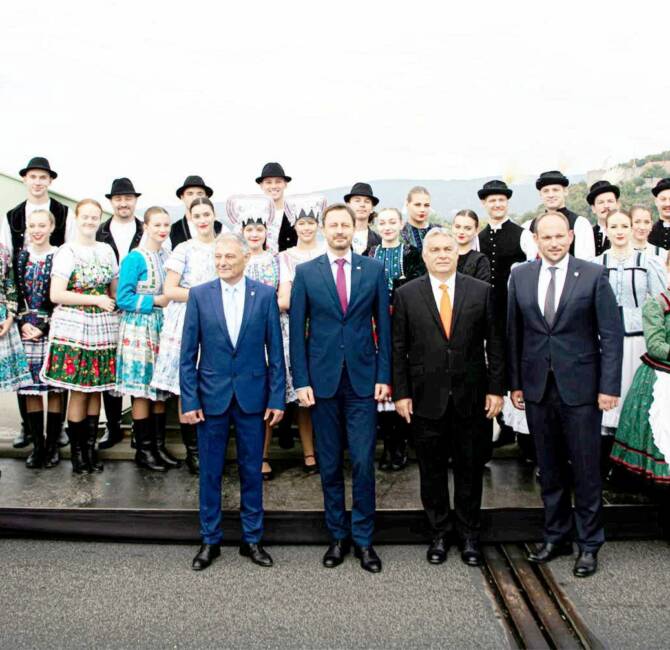Central Europe – On June 8, the EU-27 interior ministers finally approved the EU Migration Pact that had first been proposed by the European Commission in 2020. The European Commissioner for Home Affairs, the Swedish social-democrat Ylva Johansson, called this decision “a hugely significant step for migration to the EU in the Justice and Home Affairs Council”. In Central Europe, and in particular within the Visegrád Group, not everybody shares this sense of euphoria.
Hungary and Poland voted against the new pact, whereas Lithuania, Slovakia, Bulgaria, and Malta abstained. If adopted by the European Parliament in its current form, the EU Migration Pact will provide for a compulsory solidarity system for managing the arrival of illegal immigrants who file for asylum and a common framework of rules to streamline border procedures. Under the agreement, 30,000 asylum seekers would be relocated each year in other EU countries. Member states refusing to accept their quota of migrants would have to pay €20,000 per person refused. This is an issue that has haunted EU politics since the great migration crisis of 2015, with the Visegrád Group countries having always refused, up to now, any such relocation mechanism.
Hungarian Prime Minister Viktor Orbán was quick to react to what he sees as a new power grab by Brussels, as immigration issues normally fall under the jurisdiction of individual member states as per the EU treaties:
“Brussels abuses its power. They want to forcibly transfer migrants to Hungary. This is unacceptable! They want to turn Hungary into an immigration country by force.”
For its part, the conservative daily Magyar Nemzet had the following headline on June 11: “Brussels wants to bring back the era of migrant terror”: “The European Union, which has learned nothing from the failure of its migration policy, is pursuing the same unsuccessful measures as before, as demonstrated by the new migration pact that was approved on Thursday.” The newspaper then reminded its readers of the 2015 migration crisis.
In Warsaw, Polish Prime Minister Mateusz Morawiecki hit the same notes as his Hungarian counterpart:
“Forced relocation does not solve the immigration problem, but violates the sovereignty of member states. Poland will not pay for the mistakes of other countries’ immigration policies.”
Jacek Karnowski, editor-in-chief of the Polish conservative weekly Sieci, called for a “referendum on the forced relocation of migrants by the European Union” of the kind Hungary had in 2016, and he believes that it “could take place in the autumn, at the same time as the elections”. “It’s about setting up a channel through which they will send first 20,000, then 200,000, and finally 2 million (…). It’ s about forcing a change in our ethnic composition. ”, Karnowski said.
Czech Interior Minister Vít Rakušan took a more conciliatory stance, in contrast to his country’s policy when it was governed by Andrej Babiš: “I am glad that the EU has found a fair solution for dealing with migration. No quotas, but solidarity-based financial aid to the most burdened Member States.
The Czech Republic will now be exempted from the obligation to contribute, as I proposed, in view of the large number of refugees from Ukraine that we have taken in.”
Unsurprisingly, former Prime Minister Andrej Babiš, who is the leader of the ANO opposition party, sees things very differently. “Migrants take over a boat by force, there are no-go zones in Sweden, crime is rising there, and these people in Europe approve of this madness. (…) This is another invitation for illegal migration and for smugglers”, he said.
In Slovakia, former Prime Minister Peter Pellegrini, whose Hlas movement is in second place in the polls for the autumn’s early elections, has taken the same line as former PM Robert Fico on this issue. Fico is the leader of Smer, the other centre-left party, which comes first in the polls. Both parties could very well form a governing coalition after the September elections, and after the vote on the EU migration pact in the EU Council, Pellegrini left no doubt about their future policy, saying:
“We reject the introduction of compulsory quotas for Slovakia! ”
Green MEP Daniel Freund, whose obsession with the Hungarian government and the migration issue is well known, recently confessed that Hungary in particular will not receive the EU funds it is owed as long as it opposes immigration, although the official reasons are linked to rule-of-law and corruption issues – an illegal move from the European institutions.
Poland too is yet to receive its share of the EU’s Next Generation EU recovery plan, but on June 15, the Polish Sejm voted on a resolution against the new Migration Pact and PiS leader Jarosław Kaczyński announced his party’s intention to hold a referendum on this issue. This week, the Polish government published a video in which it vows to never accept such one-way solidarity, as
the financial aid received from the EU by Poland for Ukrainian refugees amounts to an average of 50 euros per person, in sharp contrast to the €20,000 Poland would have to pay for each illegal immigrant who has filed for asylum and whom Poland refuses to relocate on its territory.




